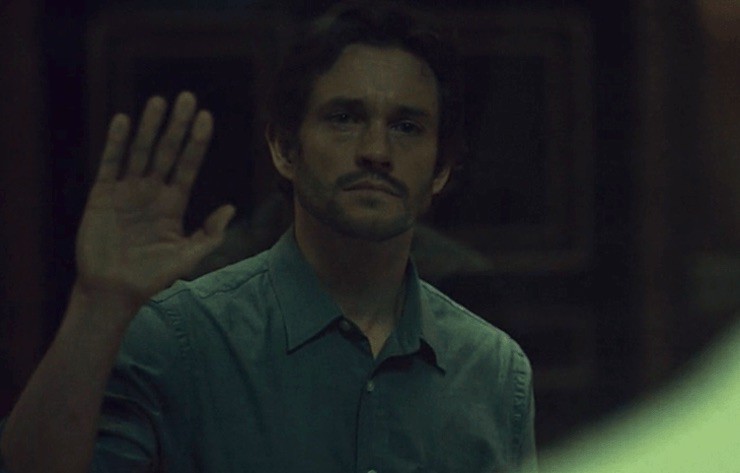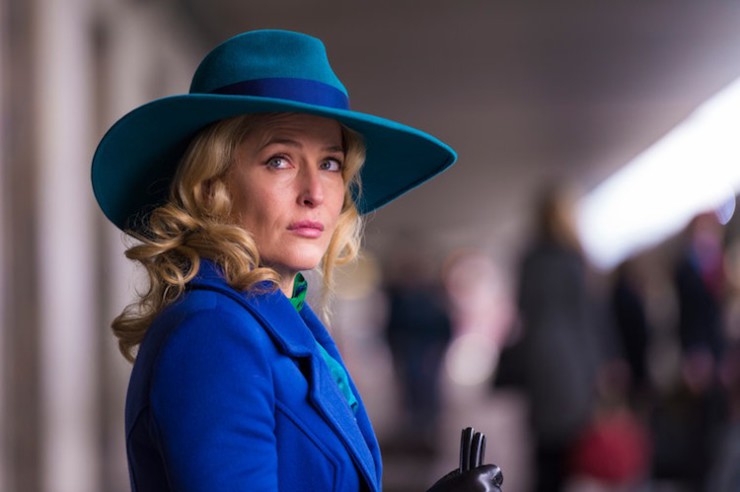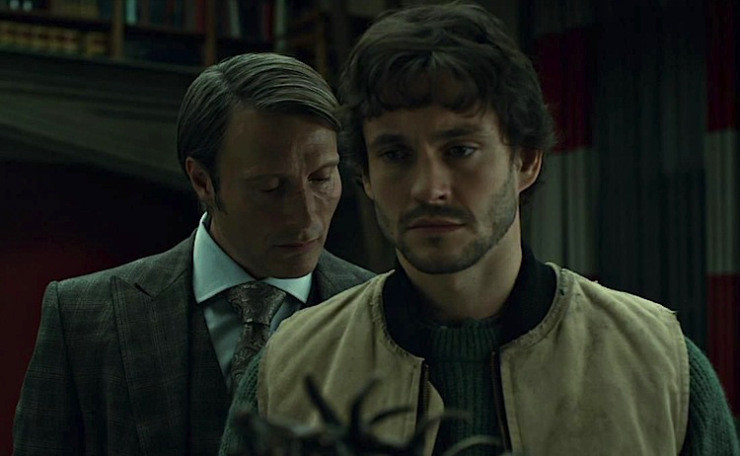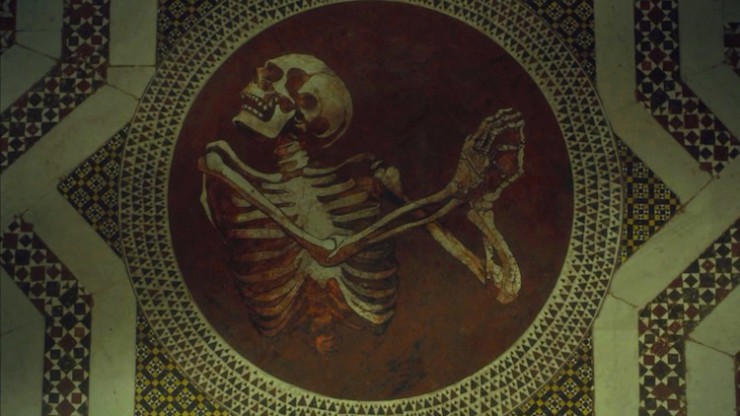I’m not going to try to give you a Hannibal finale recap. First of all, there’s nothing I could say that wouldn’t be a spoiler. But more importantly, the finale was such a perfect consummation of three years of storytelling, and such a jewel of thematic elements playing out through characters’ decisions, that I think the time is better spent A) telling all of you out there who haven’t watched the show why you should have been watching it, and B) imploring you to go catch up on it all now. Because it isn’t necessarily over, and if enough of us pour out our love through Hulu binges and Blu-ray sales, we might still get a movie or follow-up miniseries. Also, Bryan Fuller’s next project is American Gods, and if anyone cancels it before it comes to its full, Fuller-approved fruition, I may have to quit media entirely. And I need to pay rent, people.
Consider these points, and ask yourself these questions, and you’ll find that you want to binge-watch the series for yourself!
Hannibal is the Best Version of Thomas Harris’ Work
Fuller keeps the skeleton of Harris’ Hannibal stories and just the right amount of his purple prose. Everything else is up for grabs. This is one of the best examples of remix culture I’ve ever seen, with its interpretation of each book, and the movies inspired by them, copped and screwed and smothered and covered with gender-swapping, previously unseen sexual tension, colorblind casting, and invented characters who, miraculously, bring new life to the stories without ever feeling like Mary Sue caricatures.
With Hannibal, You Get Four Shows in One
Or, really, four long-form films in one series. Season 1 is a twisted, blackly funny procedural, complete with a genius profiler, a harsh boss, snarky forensics team, and a Murder of the Week format. Season 2 is an even more twisted look inside two different criminal minds. Season 3.1 is a gorgeous, moody Italian horror film, and Season 3.2 is… well, it’s Manhunter, but better, I think, because it infuses the straight thriller of Harris’ original Red Dragon arc with all the emotion and style that have been building up over the previous two and half seasons.
Would You Like Strong Female Characters?
The show flips genders of two of the canon’s great supporting characters, with brilliant psychologist Alan Bloom becoming Alana Bloom (Caroline Dhavernas), and tabloid reporter Freddy Lounds becoming TattleCrime.com blogger Freddie Lounds. Alana begins the show as a colleague/potential love interest for Will, but quickly becomes her own character, with her own, awesome, love story. Both Jack Crawford’s wife, Bella, and Francis Dolarhyde’s unfortunate girlfriend, Reba McClane, are given more agency and character. Abigail Hobbs, the daughter of Murderer of the Week Garrett Jacob Hobbs, is transformed from merely a victim of her father into her own screwed-up, morally ambiguous, living, breathing human. Likewise, Margot Verger evolves into a more complex character than just another victim of her psychotic brother Mason. Beverly Katz is the sassiest member of what the fanbase quickly dubbed #TeamSassyScience, and she also proves to be a loyal friend to Will and a great investigator in her own right.
And finally, seeing how she was invented for the series, and how Fuller kept insisting she was just as smart as Hannibal, Bedelia Du Maurier (Gillian Anderson) had the potential to be a disaster. Instead, she became one of the most fascinating characters on the show: Is she crazy? Does she love Hannibal, or fear him, or both? Does she just love murder?
Would You Also Like Colorblind Casting?
This one isn’t even something we should have to keep talking about, but Manhunter, Red Dragon, and Silence of the Lambs were all pretty much lily-white. (Clarice Starling’s roommate was played by Kasi Lemmons, and got a whole five minutes of screentime.) Bryan Fuller’s Hannibal-verse, however, gave us a diverse cast of characters. He even took the Angry Black Police Chief stereotype and subverted it by giving Laurence Fishburne’s Jack Crawford both a heartbreaking inner life and a Machiavellian talent for manipulation.
Hannibal Believes in Fan Service! But Not Too Much Fan Service.
Obviously everyone with a predilection for shipping went insane when they basked in the chemistry between Hannibal (Mads Mikkelsen) and Will (Hugh Dancy). Personally, I tend not to ship (I’m that weirdo who didn’t want Mulder and Scully to get together, because I liked the idea of a platonic partnership), but Hannibal looked at Will with such naked longing that it was hard not to read more into it. And Fuller balanced that tension with other love interests for each of them, while allowing the fascination the two men had for each other to play out organically. He gave us an insane, kaleidoscopic five-way (two men, two women, and a mythical beast called a Wendigo) that was either a hallucination or some sort of astral meeting. He allowed Will and Hannibal’s friendship to be a real friendship (and their enmity to be extremely real enmity) while always allowing room for romance to blossom in the viewers’ minds.
Subversion! Subversion Everywhere!
I already mentioned the gender-swapping, and the Angry Black Police Chief deconstruction. But it goes so much further than that. You think Sherlock had fun with Memory Palaces? We actually get to go into Will’s and Hannibal’s, on multiple occasions. Hannibal’s is, of course, an entire alternate universe of Italian churches tastefully appointed Baltimore parlors, and crumbling Lithuanian mansions. At a certain point, Will starts meeting up with Hannibal in a particular room of his. Are you sick of the Smartest Guy in the Room? Well, in Hannibal, every single person is the smartest guy, and we get to see how it plays out when they all try to manipulate each other simultaneously… which serves to skewer the cliché completely. Are you also sick of the Genius Profiler? Will Graham is the genius-est profiler I’ve ever seen, but there’s a particular reason why, which makes this one work. I’ll come back to that.
And About That Memory Palace
Season 1 sets up the idea that Hannibal uses a Memory Palace, but doesn’t really show us Will’s at all. As usual, Will is pure emotion to Hannibal’s thoughtfulness. But in season 2, when Will is jailed, the show has to do something fascinating. It was easy enough for Manhunter, Red Dragon, and Silence of the Lambs to dip into prison life. Will Graham or Clarice Starling could stop into a prison, have a tense conversation with Lecter, and walk out again to be agents in the world. If we visited Hannibal in prison, it was while he was doing something: phreaking a phone, taunting a senator, eating a cop. But in Hannibal, Will was trapped in prison for months, and he had to take his previous investigation of Hannibal into his own mind.
Team Sassy Science!
A show that deals with weekly art murders and spends its time plumbing the depths of human depravity needs a little levity. In keeping with the overall blackness of its humor, the forensics team of Zeller, Price, and Katz doubled as a vaudevillian act that mocked the murders they were investigating, and punctured some of the high emo seriousness of Will’s empathy disorder.
Humanized Victims, Humanized Murderers
The best thing about Columbo was the way sometimes the Lieutenant would befriend the Murderer of the Week. While Columbo had an absolute dedication to the law, and never let anyone escape, he also had boundless sympathy for those people who had only killed out of a sense of necessity. Of course, it was far more common for Columbo to spend time with the victim’s loved ones; here, as the case was slowly teased out over days and weeks, you had to deal with the true aftermath of a crime. In Hannibal, Will has to shoot a murderer. It is completely justified. It also ruins his life, as he obsesses over the act, and returns again and again to the idea that he may have liked it. We spend time with many of the victims, and while the murders themselves are raised to high art, we are never allowed to forget the consequences of the murderer’s actions.
Are You Sick of Catalytic Rape?
Fuller promised us a show that would neither use rape as a plot device, nor revel in sexual torture, and he delivered it, even tweaking the Francis Dolarhyde arc in key ways to pull out the idea that what The Red Dagon is truly doing is striking at families, not just women, and changing his relationship with Reba just enough to deepen both characters.
Do You Like Actions to Have Consequences?
One of the things I really loved about Daredevil was the fact that Matt and Claire don’t just magically heal after each episode. I thought it might be partly because of Netflix binge-watching—you don’t automatically have the week in between each episode, and you’re counting on people watching multiple episodes at once, so it makes sense. But Hannibal does it too—except with psychic damage. It became a bit of a joke among the fandom that Will was unkillable, but psychically speaking, when he shoots Garrett Jacob Hobbs—while the man is in the process of murdering his daughter, after Will has watched his wife bleed out, and knowing how many girls the man murdered—Will is still a wreck. For months. Forever.
He goes on to obsess over Abigail, and pin a huge amount of his own psychic well-being to her survival, believing that saving her life is the redemptive act that balances out the murder he’s committed. He also hopes that it will justify how good killing made him feel. Compare this with Matt Murdock’s season-long rumination on morality and violence, and whether he can kill Wilson Fisk, knowing that according to the morality he holds himself to, he’s damning himself. Is it still worth it? Karen, who seems to have seen some shit, has no problem with shooting Wesley five times in the chest in self-defense, but she still spends the next few days in a fog, showering, drinking, sobbing, dealing with what she’s done.
Religion on Television!
I end up writing about religion in pop culture a lot on this site, partly because it interests me, and partly because it seems to keep coming up lately. Between Sleepy Hollow, Daredevil, Constantine, obviously Supernatural, and that upcoming American Gods adaptation I mentioned, we seem to be hitting a high of religious trappings on TV. I’ve previously written about how well Daredevil dealt with this, but honestly I think Hannibal is even better.
As in other areas, Fuller takes Harris’ potentially shock-baiting Hannibal quotes…
“Did you enjoy it? Your first murder? Of course you did. And why shouldn’t it feel good? It does to God. Why only last week in Texas, he dropped a church roof on the heads of 34 of his worshippers, just as they were groveling for him.”
…and spins them into the sort of theological gold I never expected to see on network television. Hannibal has too huge an ego to simply live in a universe created by a god, but seemingly he completely believes in one. So, he casts himself as that god’s antagonist, and revels in his murders because he sees them as mirrors of God’s own. In “Sakizuki,” he even hijacks another killer’s murder for this purpose. The murderer, who claims to be an atheist, is creating a giant eye by sewing people together. Hannibal informs him that he’s trying to look back at God, and when the murderer objects saying, “There is no God,” Hannibal just clucks and replies, “Not with that attitude.” Meanwhile, Will confesses to being a sci-fi-tinged deist, believing that while God exists, it won’t ever intercede for humanity, as that would mess up the design that’s already been set in motion. This makes his own moral free-fall all the more compelling. He believes he is part of a design, but has to choose whether to use his empathy in service of what he sees as the Moral Good—saving people by catching murderers—or giving in to Hannibal’s temptation and becoming a murderer himself. He believes in a particular set of morals, yet he does not believe that anyone can help him if he falls.
Empathy
And finally, we come to the most important element of the show. I’ll need to talk around this for a few minutes before I get to the point. First, the point of horror is to get past our defenses and scare us. It has to overcome the fact that we logically know that we’re choosing to ingest a work of fiction, and wriggle its way into our brains in just such a way that real dread and unease start to take root. That’s the only way it works—whether in shocks like Scream, visceral body horror in Saw, or the more cerebral terror of The Ring. Hannibal is a horror show. It uses horror techniques to wear down those defenses, and leave us open to whatever it chooses to show us. But instead of scaring us, or even horrifying us, I would argue that Hannibal used this breaking down of barriers to make a case for the importance of empathy. It hung a lampshade on it in the first episode, claiming that Will Graham has an “empathy disorder,” implying that he was on the Asperger’s spectrum without ever nailing down quite where, and going on to say that this extreme empathy was what allowed him to put himself in the minds of killers. Hannibal claims to have no empathy, but it seems that Will brings it out in him.
Now we get to the thing that makes Hannibal so special, in my mind. It’s not the style, or the fabulous suits, or even Will Graham’s dogs. It’s the Georgia Madchen episode, “Buffet Froid.” This episode is framed as a Japanese-horror-style ghost story. It follows the same beats as a haunted house story, and Georgia has the terrifying uncanny face and long, lanky hair of a wannabe Sadako. What we learn is far worse, though—she has Cotard’s Syndrome. She literally believes that she’s dead. After a few years ricocheting around the mental health community, she has ended up wandering the country alone, unable to recognize people, and becoming severely jaundiced from eating disorders. She returns to a friend’s house looking for help, and instead finds a nightmare with no face. She only kills out of desperation.
Will is one of the few people equipped to deal with Georgia, and possibly the only person who wouldn’t automatically see her as a monster, as even her mother seems to holds herself aloof to protect herself. (Speaking, briefly, as someone who’s dealt with a variety of mental health organizations, this struck me as extremely true to life.) Will, however, goes out into the woods behind the crime scene and calls to her, telling her that she’s alive.
This is literally the first human connection she’s had in months.
When we see her lurking outside his house we fear the worst, but, because Bryan Fuller is made of magic, he turns the show in an extraordinary way. Will is awakened by his dogs, who are growling quietly, but not attacking. He jumps out of bed, realizing in a moment that Georgia has broken in. He crouches down to see her, just as her friend did during the initial murder scene. But here’s the difference. He reaches out to her, and reassures her that she’s a living human. And she reaches back. The story that was pure horror a few scenes ago has now turned into a story of empathy and kindness, and the terrified man and a girl who thinks she’s a ghost are holding hands together in the dark.
Moments like these pepper the entire series, constantly reiterating the idea that compassion and connection are the things that keep us human. Ultimately the relationship between Hannibal and Will is about the power of empathy.
Leah Schnelbach isn’t weeping for the end of Hannibal—you’re weeping for the end of Hannibal. Come weep with her on Twitter.













